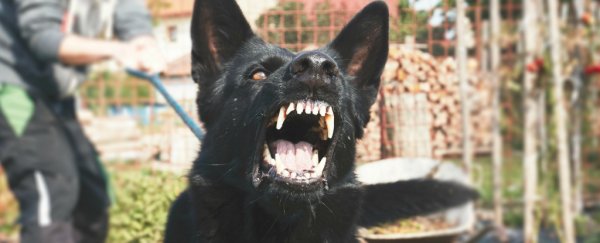A Canadian naturopath claims she treated a 4-year-old boy's behavioral problems with a controversial homeopathic remedy – this is, saliva from a rabid dog.
The recent claims have caused concern in the medical community and prompted questions about why the saliva – known as lyssinum, lyssin or hydrophobinum – has been approved by the Canadian government as a legitimate homeopathic product.
Anke Zimmermann, from Victoria, wrote on her blog in February that she used the saliva last year to treat a preschooler who had been having trouble sleeping and behaving in the classroom.
"His preschool is complaining that he hides under tables and growls at people," she wrote in the post.
Zimmermann said the young child, whom she identified only as Jonah, had been bitten by a dog in the past, and she suspected that may have led to his problems.
"People who need Lyssinum, also known as Hydrophobinum, are often afraid of the dark, of dogs, even of water, have trouble falling asleep and are overly excitable. Aggression can also be a strong feature as can dreams of dogs, wolves and being attacked. This can even develop into full psychosis," she wrote.
So she prescribed it.
"Within a minute or two of giving him the remedy Jonah smiled at me very broadly and beautifully, as if all the lights had just gone on," Zimmermann wrote.
"We said our goodbyes, and I felt a warm feeling of hope for this boy."
Such a treatment would be a health risk to users, British Columbia provincial health officer Bonnie Henry told The Washington Post on Wednesday.
"There is no evidence that I am aware of that shows Lyssin has any therapeutic benefit," she said.
"More importantly, I am concerned that if a product did actually contain what is suggested, saliva from a rabid dog, that would put the patient at risk of contracting rabies, a serious, fatal illness."
Henry said that rabies is "a serious reportable communicable disease that is almost universally fatal in humans and in dogs, and it can be spread through saliva from an infected dog."
The naturopath said in her blog post that she decided to administer "a homeopathic remedy" made from rabies because the boy had been bitten by a dog.
"Just think about how a dog who becomes infected with rabies might feel — scared and aggressive at the same time. A rabid dog will certainly growl at and try to bite other animals or people. Plus, it does not want to bite it's master, but can't help itself. Wolves and foxes are natural hosts for rabies and the whole mythology around werewolves may be directly linked to rabies.
Wolves are not normally aggressive to humans, but a rabies-infected wolf can be highly aggressive, a totally different creature, a shape-shifter. In mythology the bite of a werewolf can also turn other creatures into werewolves. The mythology around vampires is very similar.
Bottom line: Homeopathy can work wonders for children with behavioural disorders if the remedy can be clearly perceived. I have seen a number of similar cases over the years which helped me to recognize the remedy in this case so quickly. Lyssinum aka Hydrophobinum is only one of many remedies that can be helpful for children with rage, aggression and various behavioural disorders. There are many others. Treatment always needs to be individualized."
Henry, a physician and clinical associate professor at the University of British Columbia, said she is also concerned with Zimmermann's suggestion that the child's behavioral problems may have been related to a dog bite.
"While I believe that homeopathy plays a complimentary role for some families in their health, I have concerns that some people may delay or avoid proven effective treatments while relying on homeopathy alone," she said, adding that she will write Health Canada to urge it to review the approval of the saliva.
Well-known gynecologist Jen Gunter also wrote about Zimmermann's post, criticizing her claims and the use of such a controversial homeopathic product.
Zimmermann could not immediately be reached for comment Wednesday by The Post, but pushed back against the criticism in an interview with Canadian Broadcasting Corp. News.
"There's no common consensus about how the remedies work, but that they work is pretty clear. There are literally hundreds of millions of people around the world using homeopathy," she told the news organization.
Phillipa Stanaway, deputy registrar at the College of Naturopathic Physicians of British Columbia, told HuffPost that Zimmermann is licensed naturopath and that the lyssinum she said she used is an accepted treatment.
"Lyssinum is not excluded from the pharmacopeia for naturopathic doctors in B.C.," Stanaway said in an email to the news website.
"Homeopathy, which includes the use of substances such as lyssinum, is a traditional modality with a long history in the naturopathic scope of practice; it is still used by some naturopathic doctors today."
2018 © The Washington Post
This article was originally published by The Washington Post.
